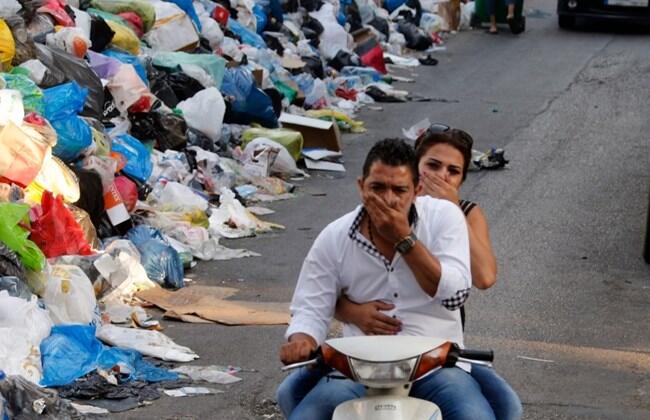Residents interviewed by The Daily Star were unanimous in suggesting that the solution to the garbage crisis, and to all the country’s woes, was to elect a new Parliament that retains no elements of the current regime. “We need new leadership, one that is secular and not the lackey of outside powers, and is in no [way], shape or form affiliated with the current political parties,” said Abed Saadeddine, a lifelong resident of Ras al-Nabaa. While the calls for change were unrelenting, most doubted that such a transformation was possible. “The situation is beyond the people’s energy and power. Any normal person would have been revolting on the street,”Mohammad Akoumas said he puffed a cigarette at a Tayouneh cafe. “[But] you have to understand that as Lebanese we are not normal, we have become so accustomed to our miserable situation that we simply do not care anymore,” he said as his friends chimed in their agreement. “We are all drugged sheep, and will always stay this way. People are sectarian as they have been raised this way, they will always follow what their sectarian leader tells them to do and this will never change,” said Abbas Hajj Hasan, Akoun’s friend. The older generation has experienced nothing but hopelessness, while the post-Civil War generation has been raised to believe thatLebanon is a failed state that will never change. Such sentiments leave little room for the development of a sense of civic duty. “People with no political affiliation can join the demonstrators, but realistically more people need their sects’ political parties just to get by,” Abdel-Kareem said as he closed his shop in Afif al-Tibeh. “If someone relies on a certain [political] party for food, medicine, and employment, he will never go demonstrate [against] the garbage crisis, as he would be demonstrating against the very people who help him,” he added, offering a reason for the sparse attendance at a Saturday demonstration at the Grand Serail. Hundreds took to the streets Saturday, marching on the Grand Serail to demand a solution to the crisis. Asked why they had not participated in this week’s demonstration, most cited ignorance of the event. “I did not know about it, there should have been massive media coverage calling [people to come] to the event, but I never saw anything,” Hadi Youssef said. Others said that while they were aware of the protest, it seemed a futile exercise. “If we are 100 or 200 people, we won’t make a difference,” said Rita, an Ashrafieh resident. Some, however, suggested that fear may have been the primary obstacle to participation. “I have a baby girl [and] they are burning garbage under our house. Naturally I wanted to demonstrate, but if I go and the security forces detain me, who will come get me?” said Tawil, a Ras al-Nabaa resident who declined to give his full name. An individual affiliated with a political party in Ashrafieh who also wished to remain anonymous said that although he wanted to participate in Saturday’s demonstration, he abstained out of fear. “If the party found out I would lose my monthly stipend,” he added. Asked about potential solutions to the crisis, most suggested that the country needed greater awareness of recycling options. “It should start at home, we should sort out the trash ourselves and teach our children to do so at a young age,” Agi Shakyan said while browsing at one of Ashrafieh’s upscale shops. “You don’t actively think, ‘I am breathing now,’ you just do it, and that is the way it has to be with recycling, it has to become that [automatic],” said Antione Salame, another of the shop’s patrons. Solutions to Lebanon’s sectarian dilemma and the political deadlock it engenders were mostly met with an open-handed gesture signifying “it is what it is.” “We need to break the sectarian barrier dividing people, but at the same time we cannot do this as we are obliged to follow our sect because that is what the political situation demands of us,” IbrahimHijaz contended. “We all have the same problem. The only way I see popular mobilization happening is through the student and worker unions, but that won’t ever happen,” Tawil said. “They too have become organized along sectarian and political lines.” The Daily Star











